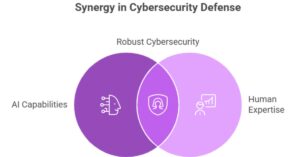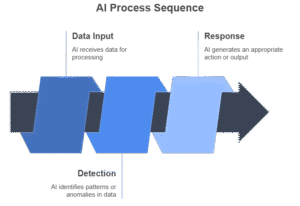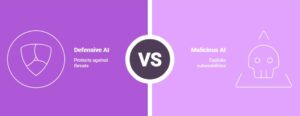Cybersecurity is now more crucial than it has ever been in the rapid digital environment of today. However, with the development of artificial intelligence (AI), one query keeps coming back: Will AI take the place of cybersecurity experts? This is also a human problem, not only one of technology. In an AI-driven world, what does the future really hold for cybersecurity defense?
Let’s simplify it all for you, replete with real-world relevance, and present you with a crystal image of what’s ahead—and how you can act.
Understanding Cybersecurity and the Need for AI in Threat Detection
With that said, let us quickly touch on what cybersecurity is. In layman’s terms, cybersecurity concerns the protection of data, devices, and networks against lots of cyber threats from hackers seeking to steal your identity to malware infecting your system.
This set of people specializes in:
- Threat detection
- Incident response
- Vulnerability management
- Regulatory compliance
And they do this across every sector—from banks to hospitals to government systems.
A cybersecurity analyst once said, “You don’t notice good security, but you’ll definitely notice when it fails.”
But here’s the problem: cyber threats are growing faster than humans can keep up. That’s where AI in threat detection comes in.
The Power of Machine Learning Algorithms in Cyber Defense
Nowadays, artificial intelligence is allowing for the identification and prevention of attacks faster and more accurately than ever. In fact, most of the existing cybersecurity systems already use AI-powered engines.
Here’s what AI-driven cybersecurity tools can do:
- Scan millions of data points in seconds
- Detect anomalies that hint at attacks
- Automate repetitive tasks like log analysis
- Help in phishing detection by analyzing email behavior
- Give machine learning algorithms front-and-center treatment for danger.
Think of artificial intelligence as a superfast assistant, swiftly scanning logs, marking suspicious activity, and doing it all in real-time.
Read more about artificial intelligence in cybersecurity from IBM.
Can AI Replace Cybersecurity Jobs? Understanding the Cybersecurity Job Evolution
This is the million-dollar question. While AI is taking over many repetitive tasks, it’s far from replacing cybersecurity professionals.
Here’s why:
What AI Can Do
- Monitor network traffic
- Flag known patterns
- Execute automated security systems
- Perform penetration testing simulations
What AI Can’t Do
- Understand business context and priorities
- Apply ethical AI decision-making
- Interpret ambiguous threats
- Make strategic decisions in gray areas
An artificial intelligence caught a user for peculiar login times in one instance. It was, however, a remote worker in another time zone—something only a human could grasp..
Human-AI Collaboration: The Future of Security Automation
Rather than killing jobs, AI is reshaping them. Entry-level roles that once involved log monitoring or alert triage are being automated, but that opens new opportunities.
Emerging Cybersecurity Roles:
- AI Cybersecurity Specialist
- Threat Intelligence Analyst (AI-focused)
- Cybersecurity-AI Engineer
- Algorithm Auditor
So the future isn’t about losing your job—it’s about upskilling to stay ahead.
Context-Aware Threat Response Through Real-Time Threat Analysis
Instead of competing with each other, AI and cybersecurity professionals can form powerful teams. Here’s how they complement each other:
Benefits of AI:
- Reduce false positives
- Accelerate threat response
- Detect zero-day threats
- Use cyberattack prediction models for proactive defense
Benefits of Humans:
- Understand intent and motive
- Adapt to new situations
- Make ethical decisions
- Guide cyber risk management strategies
The AI should be considered as your co-pilot, not the captain. It brings you where you want to.
Explore how MIT CSAIL views human-AI collaboration.
Facing Adversarial AI Threats and AI-Enhanced Hacking Techniques
AI is also being used by cybercriminals to enhance their intelligent attacks. It entails that defenders should also level up.
Examples of AI-Powered Attacks:
- AI-powered phishing detection evasion
- Adaptive malware that changes code to avoid detection
- Automated scanning tools to find system vulnerabilities
Currently, it is becoming an arms race, AI against AI, and to win it, humans should not be taken out of the loop.
Step-by-Step: How to Prepare for the AI-Powered Future
Whether you are working in the field of cybersecurity or you intend to join it, this is the time to train in AI skills. This is a step-by-step guide on the road:
1. Understand Machine Learning Algorithms
- Learn about neural networks, behavioral analytics in security, and other core concepts.
2. Learn the Foundations of Cyber Risk Management
- To be better at basics, consider such certifications as Security+ or CEH.
3. Practice with AI-Driven Cybersecurity Tools
- Explore platforms that integrate AI into cyber defense operations.
4. Address Bias in AI Security Systems
- Research fairness, transparency, and the process of testing AI model bia.
5. Stay Current on Emerging Cybersecurity Roles
- Follow industry news and community updates to stay ahead.
You may also want to read our guide on How Do Macros Pose a Cybersecurity Risk?
Ethical and Technical Limits: The Importance of AI Limitations in Cybersecurity
While AI is powerful, it raises important ethical questions:
- Does AI have a chance to make false decisions, which exclude valid users?
- What are the ways of ensuring ethical AI decisions?
- Who is responsible in case of the failure of an AI?
This is why human oversight is essential. Human-in-the-loop systems allow us to be wise in the automation process and still be responsible.
Cybersecurity Education: Embracing the Shift to Automated Security Systems
To keep up, education must change too. Cybersecurity programs now need to include:
- Machine learning and AI fundamentals
- AI ethics and data privacy
- Simulation labs using vulnerability identification tools and automation platforms
Learn AI-powered defense strategies from the Google Cybersecurity Certificate.
Final Thoughts: Will Cybersecurity Be Replaced by AI? What the Future of Cyber Defense Really Looks Like
Now this is where we should get one thing straight: AI will not replace cybersecurity, but it will change it.
- AI allows defending in a more accurate, quicker, and more manageable manner.
- However, it does not contain human perception, compassion, and situational insight.
- The human-AI collaboration will be the strongest defense.
Companies that like to spend on technology and talent will keep them on top of the threats of such nature that can come up tomorrow.
- Finally, AI is not replacing will cybersecurity replaced by ai, and the ones who come to terms with using AI are going to replace the ones who do not.
Wish to future-proof Your Cybersecurity Career? Learn the principles of AI, how to use it in an ethical way, and gain practical skills to work with the most recent tools. The cyber battlefield is evolving, and you do not want to be left behind.
FAQs:
Will AI Replace Cybersecurity Professionals Completely?
No, cybersecurity professionals are not going the lose employment to AI completely. Although certain automated routine actions, such as monitoring logs and anomaly detection, are carried out, human judgment remains crucial in comprehending business contexts, making ethical decisions, and resolving vague threats. Our future is not the replacement but the union between humans and AI.
What Cybersecurity Jobs Are Safe from AI Disruption?
Occupations involving critical thinking, ethical reasoning, creativity, and strategic decisions are termed safe. Such positions as AI Cybersecurity Specialist, Threat Intelligence Analyst, or Algorithm Auditor are on the rise, and, in reality, they utilize AI rather than are displaced by it.
How Is AI Being Used in Cybersecurity Today?
AI is powering cybersecurity by:
- Real-time detection of suspicious behavior
- When dealing with a huge quantity of log data
- Forecasting past exposure to vulnerabilities
- Replacing manual threat detection processes, automating routine threat detection tasks
This enables the cybersecurity teams to concentrate more on complicated and strategic issues.
Can AI Be Misused by Hackers in Cyber Attacks?
Yes. To use AI, cybercriminals are also:
- Avoid phishing nets
- Develop Renderable malware
- Automate vulnerability scan
It has had its share of the AI vs. AI arms race, where the only way enemies have to get ahead is to continue increasing the capabilities of weapons and strategies.
How Can I Future-Proof My Cybersecurity Career in the Age of AI?
In order not to be left behind:
- Study the principles of AI, such as neural networks and machine learning
- Learn about AI ethics and its restrictions
- Put AI-powered security technologies in use
- Pass certifications like CEH or Security+
- Remain updated with trends and shifts to new roles in cybersecurity
This is not intended to compete with AI is to collaborate with it.

Ahsan Ali is a technology blogger and the founder of Techzivo.com, a platform dedicated to delivering insightful and practical content for tech enthusiasts.He currently focuses on creating in-depth articles around cybersecurity, aiming to help readers stay safe and informed in the digital world. With a passion for emerging technologies, Ahsan plans to expand Techzivo’s coverage into other technology micro-niches such as AI, cloud computing, and digital privacy, offering valuable insights for a broader tech-savvy audience.




